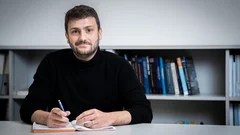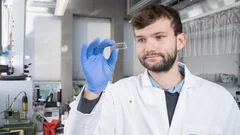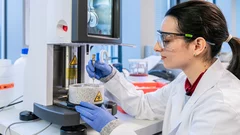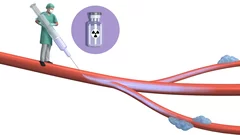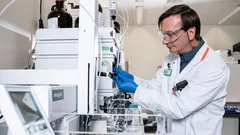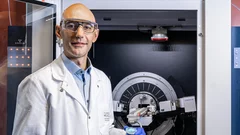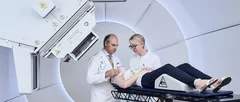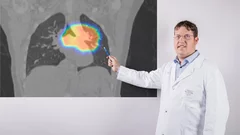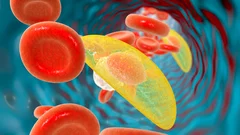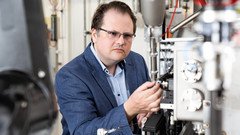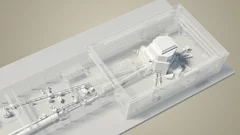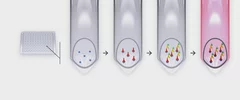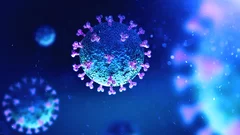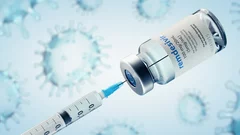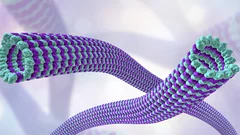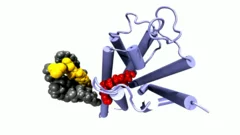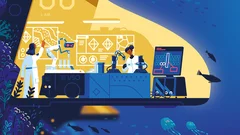Health Innovation
In the area of Health Innovation, several research groups at PSI are engaged in the study of fundamental questions regarding biology and cancer therapy. For example, they explore the structure of proteins – extremely complex biomolecules that are responsible for many different functions in organisms. Using PSI’s large research facilities, scientists also explore processes in biological tissue in order to fully understand their function and the development of specific diseases or deterioration processes. The ultimate goal is to find medicines that allow people to live as healthy a life as possible.
Patients with specific types of cancer are treated at the proton therapy facility on the PSI campus. Radiopharmaceuticals provide cancer treatments for very small tumours distributed throughout the body.
Find out more at: Overview Health Innovation
Asthma: diagnosis in a single breath
PSI is involved in the development of a breath test that can be used to diagnose asthma. Imad El Haddad explains why such a test could be extremely useful – especially for children.
New, better coronavirus rapid test
The test identifies different virus variants and improves disease prognosis.
More insight into how vision works
PSI scientists have shed light on the structure of an important component of the eye: CNG ion channels whose job is to relay optical signals to the brain.
The power of protons
This gallery presents five people who have been treated at the PSI's Center for Proton Therapy.
KSB and PSI forge a common research path
Kantonsspital Baden and the Paul Scherrer Institute PSI have signed a cooperation agreement.
Effective combination cancer treatment
Combining two chemotherapeutic drugs inhibits tumour growth.
New catalysts for pharmaceutical companies
In partnership with Roche, PSI scientists are developing new, potentially more efficient catalysts for manufacturing active substances for drug therapies.
Proton therapy: a success story that started 25 years ago
25 November 1996: a world first for PSI’s Center for Proton Therapy in treating a cancer patient using the spot-scanning technique.
A first for Switzerland: proton therapy to treat lung cancer
On 9 November 2021 a lung cancer patient was given proton therapy at the Paul Scherrer Institute PSI for the first time in Switzerland.
New active agent against parasites
PSI researchers identify potential active agent against several unicellular parasites – including the pathogens that cause malaria and toxoplasmosis.
Protein distancing
PSI researchers have developed a new method to attach proteins to the surface of virus-like particles.
Novel and emerging medical radionuclides
Better treatment for disseminated cancer.
Tracking down unreported Coronavirus cases
The University Hospital of Zurich uses proteins made at PSI for Europe’s first large-scale serology study on coronavirus prevalence in Switzerland.
PSI: advancing in the fight against Covid-19
Crystal structure analysis, computer models, cell cultures – to pursue research on Sars-CoV-2, PSI is exploring many avenues. An overview.
How immune cells are activated
A research consortium has deciphered the mechanism of CCR5 receptor activation, providing insights for the development of CCR5 drug antagonists for AIDS, cancer, and inflammatory diseases.
How remdesivir works against the coronavirus
Researchers at Goethe University Frankfurt, in cooperation with the PSI have probably discovered another, previously unknown mechanism of action of the antiviral remdesivir.
Cell cytoskeleton as target for new active agents
Using a combination of computer simulations and laboratory experiments, PSI researchers have identified new binding sites for active agents on the vital protein tubulin.
Watching receptor proteins changing shape
In our bodies, G protein-coupled receptors mediate countless processes. PSI researcher Ramon Guixà talks about how he brings those receptor molecules to life on the computer screen.
"Ultimately, we aim to understand how diseases start in single cells"
Imaging and sequencing techniques combined with machine learning offer researchers countless opportunities to look inside cells with greater precision than ever before. G.V. Shivashankar, lab head at PSI, describes how such information can be used to find answers to pressing questions.
Wait and see, and grow crystals
At PSI, researchers decipher the structure of the proteins in bacteria and viruses. This knowledge can aid, for example, in the development of drugs against infectious diseases. But before the investigation can begin, an extremely tricky problem has to be solved: the crystallisation of the molecules.
